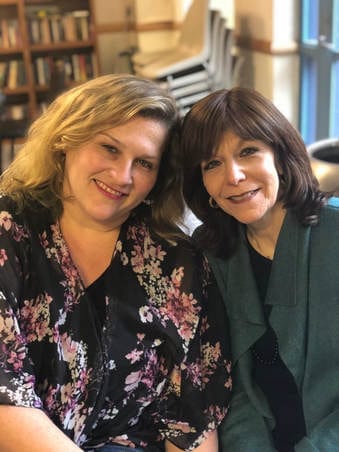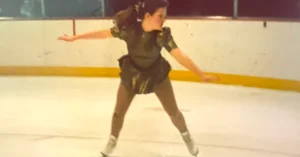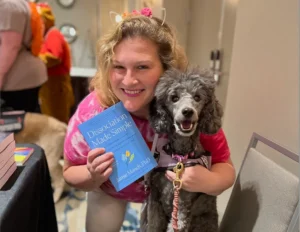I first met Sharon in Monroeville, Pennsylvania sometime in 2013. I was still working the national circuit for PESI, an educational company, teaching general trainings on trauma-informed care. In this 2-day course, presenting a live clinical demonstration in eye movement desensitization and reprocessing (EMDR), my method of choice for treating trauma-related concerns, was part of the syllabus. As I did dozens of times before and have done hundreds of time since in my teaching, I asked for a willing volunteer for the demonstration, inviting them to come up and see me over break for screening. This lovely, traditionally dressed woman raised her hand immediately. During our screening, as we talked about her background and the issue she’d like to work on, Sharon revealed that she is an Orthodox Jew. Although she seemed to be connecting to what I taught in the course, I experienced a bit of an internal struggle, wondering if someone so traditional would respond to what I had to offer. I’d long identified as rainbow flag-waving tattooed rebel dismissive of most things connected to organized religion or anything traditional. Yet something inside told me immediately that I loved this woman and her willingness, and I was delighted when Sharon responded so well to her work in the demonstration.
Afterwards, in amazement, Sharon declared, “I have to learn this!”
She went on to explain her frustration that every EMDR training she ever found took place over the weekend which would not work for her as an Orthodox Jew. Specifically, Sharon is a Hassidic Jew in the Chabad-Lubavitch movement with a strict adherence to Shabbat observance. Training over a weekend just wasn’t an option for her, even though other folks from religious traditions have missed weekend services before to come to trainings. Sharon began traveling to Ohio to learn from me as I developed my initial training models and ideas around teaching EMDR therapy, expressing only gratitude that she was able to engage in this study during the week and in a mindfully delivered, intuitive way that matched up with her almost forty years of experience as a hypnotherapist. The more she studied and consulted with me, the more I began to trust her as a clinician and to truly love her as a person. The questions she asked helped me to grow as a clinician, and I developed an even deeper sense of wonder about Jewish faith and traditions.
In 2015 when I became officially approved by the EMDR International Association to offer basic trainings in EMDR therapy, Sharon immediately courted me to come to Squirrel Hill where she practiced and lived. She said something like, “I can get you every Orthodox therapist in Pittsburgh to come to the training if you can offer it during the week.”
When one of Sharon’s colleagues first met me, I got the once over, punctuated with the commentary of, “You’re the Jamie, Sharon’s teacher? You’re so young!”
Although I’ve gotten my fair share of the “you’re so young,” comments throughout my career, this one did not impact me with any insult. Rather, it helped me to understand why I respect Sharon so much. She is constantly willing to learn something new, especially from those of us in the younger generations. I watch how her grandchildren teach her new ways of seeing the world, and I hope that I can emulate this spirit of hers to constantly be a learner as I grow up into the example she is setting. And although I started as her teacher, it’s safe to say that we have both been each others’ teachers as our friendship has grown.
Coming to Squirrel Hill to train was a good fit for all of us—for Sharon’s community of clinicians in the neighborhood and for the growing Institute for Creative Mindfulness wanting to establish a base in Pittsburgh. When I visited Squirrel Hill for the first time, some tears filled my eyes. There are moments here when I feel like I’m in Eastern Europe, where I spent a great deal of late teens and early twenties studying and working, primarily in my ancestral homelands of Croatia and Bosnia. There’s just something about the vibe of Squirrel Hill and its Jewish soul, beautifully blended with other cultural influences in the container of Pittsburgh, its own cultural wonder, the visceral epicenter of our region’s heartiness. Something magical happens here at this area around the intersection of Forbes and Murray Avenues. In the past three years I’ve adored working with the people of Squirrel Hill and I enjoy spending time here with both friends and Sharon’s family. Sharon has always taken great care to assure that a guest bedroom in her home that is set up to accommodate her large family for holidays is always ready for me when I come to town. I typically stay in one of the basement guest rooms and sleeping down there feels like I’m in a warm cave being blanketed by an entire house that’s full of tradition and love. I’ve said for several years now that Squirrel Hill is truly my second home.
Sharon has seven children and a slew of grandchildren (I can never keep count). I’ve had the privilege to get to know many of them and their spouses, including one of her sons who is now a budding therapist and has trained with me. I attended the wedding of her youngest son and considered it the greatest honor ever when Sharon began caring for me in a way that led her to declare, “I’m sorry, I can’t turn off the Jewish mother in me.” The first time is when we were leaving her house in Squirrel Hill—it was a rainy morning and we were crossing the street to my parked car, on our way to the training site. A car came unexpectedly whizzing down her street and she brought out the infamous “mom arm” to protect me. Later that year, Sharon and I roomed together at the EMDR International Association conference in Minneapolis. While I’ve enjoyed a wide array of roommate experiences as I’ve traveled for work over the years, Sharon’s attention to detail in making sure I didn’t forget things and that I had a sounding board for things going on at the conference warmed my heart. She once again said something like, “I can’t turn off the Jewish mother,” and I thought to myself, “Nor do I want you to.”
My entire life I’ve struggled with feeling accepted by the people closest to me, especially in my family of origin, because my beliefs and way of being in the world is so different from their traditional (Christian) views. Sharon’s acceptance of me, even as a religious woman, includes a full embrace of my soul and my questions, even when we disagree on certain approaches to life, faith, and identity. While I wish that more devout people from all faith traditions would learn from Sharon’s example of acceptance, knowing her gives me hope that the healing power of what St. Benedict called radical hospitality is possible. Sharon’s willingness to bring me around her family and feel the warmth of their friendliness and the candidness of their interactions with me—even though they are all religious and I am more of a liberal hippie, “spiritual but not religious” type makes me know in my bones that we all have more in common than not. Knowing Sharon Saul and having her as my Jewish Ima (mother) is nothing less than a corrective experience in attachment. And it’s restored my faith that getting to spend substantial time with people from faiths and cultures other than our own is a big part of the answer to bringing about the healing of the world.
So, it’s little wonder that I wanted Sharon to join our Institute for Creative Mindfulness team as both a consultant and a facilitator as soon as she was eligible. In the midst of this Squirrel Hill tragedy she referred to EMDR therapy as “God’s tool for healing,” and I cannot disagree! She is a fabulous educator and mentor and serves our EMDR trainees well. Sharon is responsible for building enthusiasm about EMDR therapy in Squirrel Hill, working very hard to find us good spaces to train during the week. So many of the therapists we have trained here are now on the front lines of working with the community this week and will be in the coming weeks as the people of this neighborhood seek answers and healing.
But even if Sharon didn’t work with me in this professional capacity, I would still want her to me my friend… and of course, my Jewish mother. Even in the midst of debriefing her own experience of this week’s tragedy with me, Sharon still offered me spiritually on point advice about my own love life and my career path, as any attuned mother would. As we sat together the other night in our moment of awe at the Divine dance that brought our lives together, it dawned on me that a friendship like ours and everything it represents is the answer to the madness in which we find ourselves in this modern world. This isn’t something, even as a writer, that I can put elegant syllables together to explain. I simply challenge you to experience it if HaShem ever gives you the chance, because HaShem will.
In her infinite, faith-filled, maternal wisdom Sharon declared, “HaShem, you have a view of the bigger picture. I trust you when I can only see the parts of that bigger tapestry.”
Sharon and I both had the opportunity to do trauma response work this week in Squirrel Hill and were amazed at how this tragedy is bringing other things to the surface for people that have long needed healed. This poses, once more, the age old question: Is tragedy’s hidden gift the sparking potential it holds to stir us into action, first within ourselves and then in our communities? The idea of changing the world can feel overwhelming and impossible, especially with the hopelessness and hatred that seemingly paralyzes our existence. Perhaps the real answer is to heal ourselves and then make a difference on a one-on-one relational level, as Sharon and I have done with each other. When the small pearls of these healings and interactions string together, we create a valuable and beautiful force that will transform the world.
After working together today at the Jewish Community Center here in Squirrel Hill Sharon continued with her teaching for me that began the night before on the importance of the bigger picture: “It just feels like the redemption really is at hand and all of us good people doing all the good we can and all the healing we can it’s our job to just tip it. It feels like we’re almost, almost, almost there.”





One Response
EMDR therapy has emerged as a highly effective treatment for trauma recovery, providing a beacon of hope for those struggling to overcome deeply rooted psychological wounds. By utilizing bilateral stimulation, EMDR helps patients process and desensitize traumatic memories, facilitating profound emotional healing and resilience. Reacting to the statement that EMDR therapy is “God’s tool for healing,” it’s clear that many individuals find profound solace and transformation through this approach. For those who hold spiritual beliefs, the alignment of EMDR’s therapeutic benefits with their faith can amplify the sense of divine intervention and support on their path to recovery. Regardless of one’s spiritual perspective, the structured methodology and significant outcomes of EMDR underscore its vital role in modern trauma therapy.